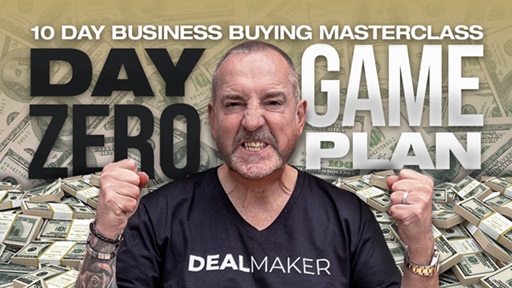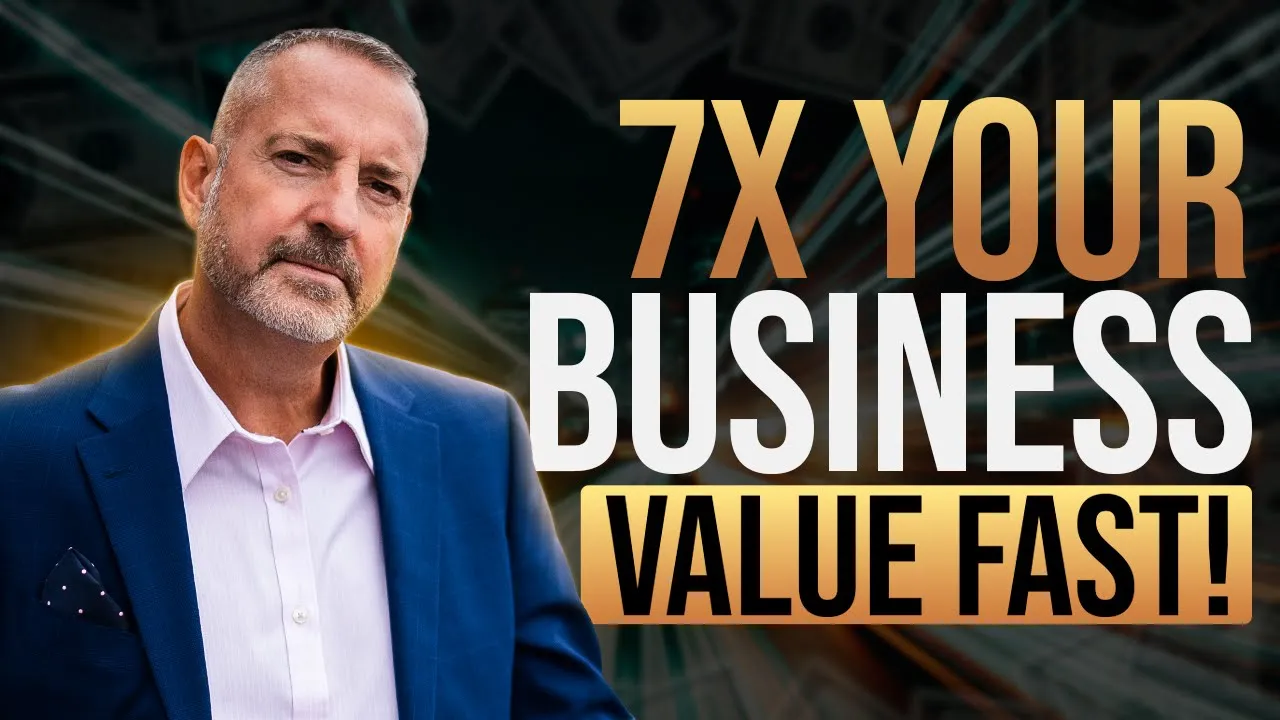Day 3 – 10-Days To Buying Your First Business | “Deal Origination”
Day 3 – 10-Days To Buying Your First Business | “Deal Origination”
Hey, guys. It’s Carl Allen. Welcome to day three of ten days for you acquiring your first business. Dealmakers, what’s up?
My vision is to completely and utterly disrupt the market for buying and selling small businesses all over the world. So yesterday, we talked a lot about your buy box. What are the determinations that you need to go through regarding the sectors that you know and you understand and you can have value to, whether whether you wanna be an owner investor or an owner manager. We talked a lot about, location. I was in a strange location. I was driving around. I have to drop my son off at a soccer academy trial.
He did very well, actually. He’s got, some games coming up for that, which is really good. I know a lot of you have been blowing me up from yesterday’s video wanting to know how we went on. I appreciate that. But today, we’re gonna talk about deal origination.
So deal flow is the kind of holy grail because if you don’t have any deals to analyze, if you don’t have any sellers or business owners that you wanna meet, then you can’t really deploy a lot of the lessons and the strategies that I’m gonna teach you over the rest of these ten days. So once you’ve identified your buy box and you know exactly what types of businesses that you wanna do versus the ones that you don’t, which is also really, really important, now we get into deal origination.
So there are four major categories of deal origination, and I’m gonna go through them right now. I’m gonna create four big red boxes, and then I’m gonna fill them in. They’re all very different.
They all have advantages and disadvantages. So let’s start off with the first one. And the first one is really the place that everybody goes to when you’re kind of a rookie and you don’t really know a lot of the different strategies, and it’s brokers.
So there are literally thousands and thousands of business brokers out there. There are lots of kind of aggregator sites, like MLS if you’re into real estate. The largest, most popular one is called BizBuySell.
So everybody that’s looking to list a business for sale goes on on BizBuySell.
Now I’m not a massive fan of business brokers. Right? And let me explain why. There’s three reasons.
The first reason is only about twenty percent of businesses that actually get sold actually get sold through business brokers. The other eighty percent sell off market, which, ironically, covers the next three boxes. But let’s stay with brokers. So only one in five businesses that actually sell will sell through a business broker.
Business brokers have a tendency to inflate the valuation just to get the listing. An average business broker, by the way, will only sell one in twenty businesses that they actually take on. A typical business broker will make more money from listing fees than they will from closing fees. And the job of a business broker is to sell the business, is to transfer the ownership.
So I don’t like them for that reason. Some of them are really good. I really like Transworld, for brick and mortar businesses, and I really like website closes for online businesses. I have great relationships, with those guys.
And a problem with a lot of brokers is, you know, the guys that I mentioned before have already good, but most of the others, they don’t have the relevant training. They don’t have the relevant financial or personal or business training, so they can give really best advice to the business owner. The other problem with brokers is brokers can get in the way of you building know, like, and trust with the business owner. Often, they can stop you going one on one directly with a seller.
We’ll talk about meetings tomorrow in day four.
And when brokers are involved, they can kinda get in the way and and kind of disrupt that harmony, that friendship, that trust that you’re building with the business owner.
So brokers, not my, not my cup of tea, as we say in the UK. And one golden rule that I have with business brokers is I only play with business brokers where they’re listing a business that’s been on their site or in their database for more than nine months. So why is that? And I’ll tell you.
So the job of a business broker, really, is to sell a business to another business. They don’t like selling it to financial buyers or individuals like us. They wanna find a larger company that can generate a lot of synergies and a lot of cost savings by combining businesses together. That’s called a bolt on acquisition.
We’ll get into that later. However, most broker contracts are twelve months in length. So when you get to nine months through a listing, what I actually do is I go on BizBuySell. I’ll pick a sector, location, a size, and then I’ll filter by how long the business has been listed.
If It’s been listed less than nine months. I don’t even go there. I wait till it’s in that final three months, and then the psychology changes. The psychology between the broker, the seller, and you as the buyer changes because they’re desperate.
The broker’s desperate to get a deal done within those final ninety days. And if you’re going down a route where you’re raising capital to make a closing payment, you’re gonna need those ninety days to go through that financing process.
What I also do is sometimes I look at deals that are less than one month to go. So they’re eleven months plus listed. That’s a great way to get an annuity deal done where you can buy the business like you would lease a car and just pay for the business month on month through the cash flow that the business generates. There’s no time in that last month or a few weeks to go down the financing route.
If the broker wants to sell and get a fee, they’re gonna even promote a long term seller financing deal, a zero money down at closing deal to get that done. So brokers is the first place that most people go. Use brokers with caution. Use it as part of your overall deal origination strategy.
But what you really wanna do is you wanna be thinking about going off market. It’s like the real estate market. I know a lot of you guys are into real estate. So if you go to Zillow or you go to all these MLS sites, there’s loads of different people kinda looking at these deals.
In business acquisitions, there’s not as many because there’s a lot more people buying real estate than there is buying businesses. It’s like thirty to forty x higher in the United States buying real estate than actually doing business deals. But off market for us is the way to go. And there’s three ways to go off market and add a lot of value.
The first one is building a network.
Now I’ll tell you why this is really, really important. So before any business owner goes to a broker, they go through the realization in their mind that they are ready. They they are personally, financially, and business ready to transfer the ownership of their business to somebody else, whether it’s retirement, boredom, frustration, burnout. We talked about that in in the buy box training yesterday. Whatever their reason, before they go anywhere near a business broker, we’ll talk to four people. Who do they talk to? Well, they’ll talk to their CPA.
So every business has a CPA. We’ll call their CPA and say, hey. Thinking about selling my business this year. Get ready.
We’ll call their lawyer. We’ll say, hey, mister attorney, mister lawyer, thinking about selling my business this year. Get ready. Someone’s gonna need to do some due diligence. Someone’s gonna be creating a a sale and purchase agreement or an asset purchase agreement to buy the business. Get to that later in the series. Get ready.
They call their wealth manager. This is my favorite network to build. They call their wealth manager. So a big part of transitioning business ownership is for the business owner to realize some capital and then deploy that capital into the market to kind of fund retirement.
So their wealth manager or their tax planner or their estate planner, whatever you wanna call them, and there’s literally hundreds and hundreds of thousands, if not millions, of these people on LinkedIn. So go and build a network with these guys. Get to know them. Tell them your buy box.
They’re talking to business owners every single day about these retirement planning issues. So if you wanna buy an engineering company in Wisconsin, that’s your buy box, and you’re calling wealth managers in Wisconsin, they’re gonna have engineering business owner clients that they’re already having conversations to. So building that network is really, really important. The final one is a financier or a bank.
If you’re a business owner, somebody has deployed some capital into your business or you’re depositing money with the banks. If you’re networking with banks and investors and lenders and all the people that make up the kind of the financial ecosystem, you’re networking with those people in your local area. Again, they’re all gonna have access to deal flow. So all these guys have got deal flow in your buy box before anybody goes anywhere near the business brokers.
So definitely do that. If you were only to do one of these strategies, that would be my recommendation. Two more to quickly talk to you about. The third one is called the direct approach.
So a direct approach is a very clever psychological strategy that we’ve deployed. And if you sign up for my ten day business buying training, and the link is below in the comments for this video, I’ll give you all the tools and the templates that you can leverage for yourself to generate deal flow using these methods. The direct approach has two components.
So part a is you go build a list. So, again, in the train the training that you can, go into if you like, I give you the lists of all the, the data providers like Data Axle and Hoovers and Dun and Bradstreet, where you can get, free lists of businesses. So you can say, hey. Show me all of the engineering companies in Wisconsin within fifty miles of my location. They’re doing between one and five million dollars in revenue.
Gives you the list, tells you who the owners are, all the contact information. So you’ve got the list of targets. You can go on their websites, figure out, does that business fit my buy box? Yes. It’s on the list. No.
Pass it on to somebody else or or or do whatever. And then once you build that list, then you write to them, and you write to them with a letter. We don’t use email. Right? Why do we not use email? So I own twenty different companies.
I’ve got personal emails and all that different stuff. I get over a thousand emails a day. I actually have to hire a virtual assistant just to go through all my emails every day. It’s like a full time job.
It’s crazy. I don’t get any letters. I probably get three letters a week. I just came back from a a two week trip to the United States.
I went to seven different states in fifteen days, board meetings, speaking at events, masterminds, looking at businesses to buy, etcetera, even closed a deal. I was out there. I got back.
There was over twenty thousand emails in my inbox because my VA had taken a break as well. Crazy. I have three letters.
I go home. I’m like, woah. It’s a letter. Normally, it’s, it’s an invoice for something or, you know, a nice letter, personalized, colored envelope, handwritten, you know, all that stuff. We can teach you exactly how to send those letters, craft those letters, position those letters in the ten day business buying launch training. Again, click the link in this video. We send those letters, and in those letters, we build rapport.
So how do we build rapport? Well, we do three things. Number one, we tell them all about ourselves, so why you want to buy a business in their sector. So tell them a little bit about yourself that they’re they’re gonna find appealing.
Number two, we find out some information about the business using the website or Google searches, and you can hire a VA. Seven dollars an hour in the Philippines to do this for you if you like. They find out some things. Have they won an award?
Have they hired a new member of staff? Have they signed a new contract? Did they do something very unique, very specific in their market? Are they highly differentiated in what they do?
Have they got in such a property? Have they just merged with another business? Whatever it is, there’s all the stuff online, the Internet that you can leverage. So you put some stuff in the letter that compliments them.
Hey. You know, I really like your engineering company in Wisconsin. I see you’ve just hired this great guy. You’ve just won this award.
You’ve just signed on this new contract. And I love your kind of vision on your website about how you position yourself inside of your marketplace. I I can see why you’re a successful company and why your customers love you. Like, a business owner’s gonna read that instead of saying, hey.
I wanna buy your business. Please call me. You’re complimenting them on their business. Right? It’s like, have you ever gone out on a Sunday with your family and you’ve got a couple and they’re walking, say, a dog, and the dog’s like a really cute dog, and you go up to and say, hey.
I love your dog. He’s so cute. Let me stroke him. What a beautiful dog. You’re building massive rapport with that person.
You know, anyone that’s wheeling a little newborn baby in a pram and you say, oh, wow. But how old’s the baby? I normally get the sex of the baby wrong. I’ll say, hey.
How old is he? And they say, it’s a girl. That breaks rapport. Right? So, you know, you know what I mean.
When you when you talk to somebody that has a little baby, say, oh, wow. Your baby is beautiful.
Like, you know, what’s what’s her name? What’s his name? How old are they? Like, are they are they a good baby?
Are they, you know, whatever. You’re building rapport. They’re gonna know you and like you by doing that, and that’s what we’re doing in these letters. The second thing that we can do in a letter is we can find out some information about the business owner themselves.
You can find them on LinkedIn. You can find them on Facebook. They might be on Instagram. If they’re young enough, they might be on TikTok and all of these other social excuse me, media sites.
And you can find out whether they go on vacation. Are they into a particular sports team?
Have they been to a certain restaurant? You know, what are their interests? What are their hobbies? And, you know, I’ve leveraged this all the time. I bought businesses from people because I found out before meeting them or writing to them that that they were really into Tony Robbins or they really loved, like, a particular movie.
So even if I don’t know anything about any of those things, I will research that or get my VA to research that, and I drop that information into the letter. So you want people to read those letters and think, wow. This person’s really interesting. They they know a lot of things about my business, and they know things about me.
I can relate to that person. That drives the conversion of you sending a letter to then getting a follow-up call and having a meeting to discuss the purchase of the business. So direct approach is really, really good. And then the final one is social media marketing.
Now when I first started as a dealmaker back in nineteen ninety two, I was working on Wall Street. We didn’t have Google and Facebook and YouTube and Instagram and LinkedIn and the Internet. I had this little black screen on my desk called the quote one, and we used to get it was a green screen with, with all these crazy numbers on. We used to get stock quotes and news and all these different things.
We didn’t have what we now have as the Internet, which I think a lot of the times we can take for granted. And some of the best deals I’ve ever originated, some of the best deals my students have ever originated and acquired as businesses are deals that they’ve got from social media. We we leverage LinkedIn. We leverage Facebook.
We leverage Clubhouse. You can network and join these groups online, get to know people, and then there’s deals that come out of those. And, again, I’ll teach you all of these different strategies in detail inside of the ten day business buying launch program. It’s a couple of hundred dollars.
It’s a great entry level training to come into this marketplace. Click the link below, get into that training, and I will get you through all that. So those are the four primary methods we use for deal origination. We use brokers, especially if they’re nine months listed or beyond.
We build networks of CPAs, wealth managers, lawyers, and financiers. We leverage social media marketing using all the free incredible tools that are out there, and we leverage the direct approach. We build lists using free data sources, and then we craft psychologically compelling letters that drive a business owner to take an action, or the action is to call you and schedule a meeting or a Zoom call. We can get into the next stages, which we’re gonna be talking about tomorrow in day four.
So I hope you found that useful. Again, please click, like and subscribe to these videos so you’re getting them every time I post them. And if you want to take me upon the offer of going into the detailed ten day business buying training, click the link below, get yourself signed up, and I’ll see you inside of that Facebook group. Until then, my friends, I will see you soon.
Bye bye for now.




